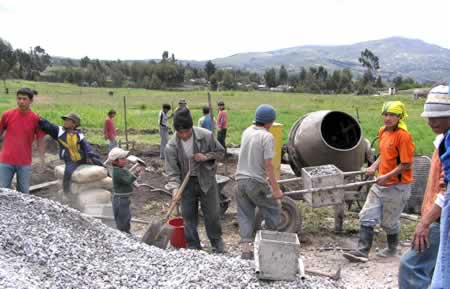Edition #15, August 2005
Preview of themes of EcoMaterials 2005
 An
introduction to the illustrious panels that will launch each day of the
upcoming EcoMaterials conference forms the basis of the accompanying
report. All continents are represented by the participants, who include
academic luminaries, as well as people of wide experience and
provocative ideas from government and civil society organizations. The
specific commissions each day reflect a potpourri of presentations,
well-addressed to the particular theme of the day, whether New
Developments, Connecting Science with the Grassroots, or Policies.
An
introduction to the illustrious panels that will launch each day of the
upcoming EcoMaterials conference forms the basis of the accompanying
report. All continents are represented by the participants, who include
academic luminaries, as well as people of wide experience and
provocative ideas from government and civil society organizations. The
specific commissions each day reflect a potpourri of presentations,
well-addressed to the particular theme of the day, whether New
Developments, Connecting Science with the Grassroots, or Policies.
The constructor and the apprentices
 Nicaraguan
builder, Martin Gutierrez, participates in programs of apprentice
education with two vocational education institutions as well as housing
programs of SofoNic. He cannot hide his enthusiasm of contributing to
the development of the young people in his country. Over the years he
has included electricians, plumbers, welders and masons will now
integrate three students who are about to graduate as construction
foremen, but require a practical experience. He also has incorporated
recently graduated engineers as construction supervisors. The young
people are exposed to a wide variety of situations from housing
settlements to apartment buildings to individual upmarket dwellings.
Nicaraguan
builder, Martin Gutierrez, participates in programs of apprentice
education with two vocational education institutions as well as housing
programs of SofoNic. He cannot hide his enthusiasm of contributing to
the development of the young people in his country. Over the years he
has included electricians, plumbers, welders and masons will now
integrate three students who are about to graduate as construction
foremen, but require a practical experience. He also has incorporated
recently graduated engineers as construction supervisors. The young
people are exposed to a wide variety of situations from housing
settlements to apartment buildings to individual upmarket dwellings.
Pedals for Progress - Sustainable Partnerships
 Pedals
for Progress has recently concentrated its activities on sustainable
partnerships. These are organizations are able to cover the shipping
costs from the U.S.A. to country of destination, the most critical
factor in creating a sustainable self financing partnership. It
currently considers seven partnerships as “sustainable”, five in
Central America, one in the Caribbean and one in Africa. CESTA in El
Salvador is the organization that has received most bicycles over the
years. PfP is hopeful that other partner organizations, including
several that did not receive bikes during the current year, will enter
onto the team of sustainable partnerships.
Pedals
for Progress has recently concentrated its activities on sustainable
partnerships. These are organizations are able to cover the shipping
costs from the U.S.A. to country of destination, the most critical
factor in creating a sustainable self financing partnership. It
currently considers seven partnerships as “sustainable”, five in
Central America, one in the Caribbean and one in Africa. CESTA in El
Salvador is the organization that has received most bicycles over the
years. PfP is hopeful that other partner organizations, including
several that did not receive bikes during the current year, will enter
onto the team of sustainable partnerships.
School for young restorers
 “Challenge
of a utopia, an integral strategy to save old Havana” is the title of a
book about the restoration of Havana. An innovative school for young
restorers plays an important role in this strategy. It prepares young
people for the ongoing restoration activities in Old Havana, which is a
UN patrimony of humanity. During their two-year apprenticeship they
learn the theoretical and practical issues of restoration and also how
to work and use different materials and tools that are not used
nowadays. They learn the arts of masonry, carpentry, painting, glass
craftsmanship, stone masonry, mural and gypsum painting for the
restoration of the old damaged buildings.
“Challenge
of a utopia, an integral strategy to save old Havana” is the title of a
book about the restoration of Havana. An innovative school for young
restorers plays an important role in this strategy. It prepares young
people for the ongoing restoration activities in Old Havana, which is a
UN patrimony of humanity. During their two-year apprenticeship they
learn the theoretical and practical issues of restoration and also how
to work and use different materials and tools that are not used
nowadays. They learn the arts of masonry, carpentry, painting, glass
craftsmanship, stone masonry, mural and gypsum painting for the
restoration of the old damaged buildings.
Minga: communitary work
In Ñuca Huasi (“Our Home” in Quichua) in the foothills of the Volcano Chimborazo in Ecuador, the community continues the tradition of “mingas”. This tradition of community work goes back to pre-colombian époques and is based upon voluntary work, the expectation of which is solidarity and reciprocity. In modern times as such qualities are being lost, it is most refreshing to see that this voluntary work remains in many Latin American communities where cooperation, solidarity and reciprocity are still present.




